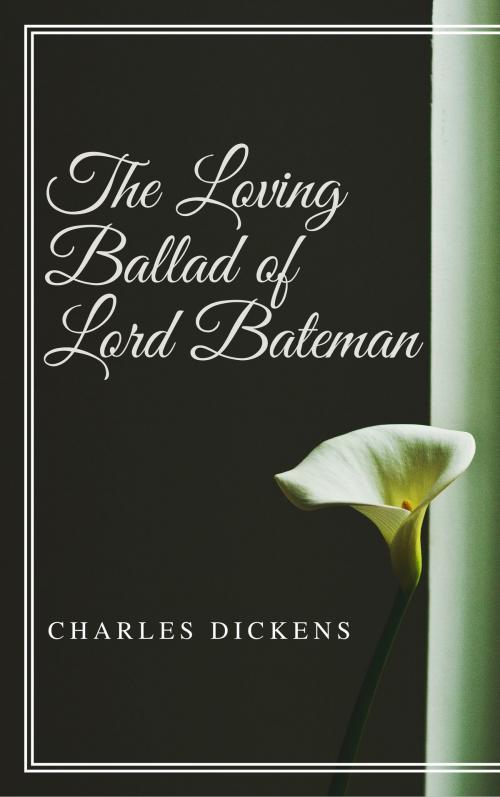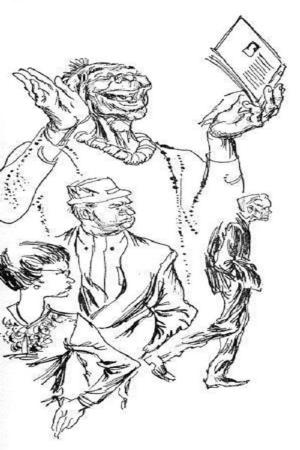The Loving Ballad of Lord Bateman (Annotated & Illustrated)
Fiction & Literature, Poetry, Inspirational & Religious, British & Irish| Author: | Charles Dickens, William Makepeace Thackeray | ISBN: | 1230001413700 |
| Publisher: | Consumer Oriented Ebooks Publisher | Publication: | November 4, 2016 |
| Imprint: | Language: | English |
| Author: | Charles Dickens, William Makepeace Thackeray |
| ISBN: | 1230001413700 |
| Publisher: | Consumer Oriented Ebooks Publisher |
| Publication: | November 4, 2016 |
| Imprint: | |
| Language: | English |
*This Book is annotated (it contains a detailed biography of the author).
*An active Table of Contents has been added by the publisher for a better customer experience.
*This book has been checked and corrected for spelling errors.
In some collection of old English Ballads there is an ancient ditty which I am told bears some remote and distant resemblance to the following Epic Poem. I beg to quote the emphatic language of my estimable friend (if he will allow me to call him so), the Black Bear in Piccadilly, and to assure all to whom these presents may come, that "I am the original." This affecting legend is given in the following pages precisely as I have frequently heard it sung on Saturday nights, outside a house of general refreshment (familiarly termed a wine vaults) at Battle-bridge. The singer is a young gentleman who can scarcely have numbered nineteen summers, and who before his last visit to the treadmill, where he was erroneously incarcerated for six months as a vagrant (being unfortunately mistaken for another gentleman), had a very melodious and plaintive tone of voice, which, though it is now somewhat impaired by gruel and such a getting up stairs for so long a period, I hope shortly to find restored. I have taken down the words from his own mouth at different periods, and have been careful to preserve his pronunciation, together with the air to which he does so much justice. Of his execution of it, however, and the intense melancholy which he communicates to such passages of the song as are most susceptible of such an expression, I am unfortunately unable to convey to the reader an adequate idea, though I may hint that the effect seems to me to be in part produced by the long and mournful drawl on the last two or three words of each verse.
I had intended to have dedicated my imperfect illustrations of this beautiful Romance to the young gentleman in question. As I cannot find, however, that he is known among his friends by any other name than "The Tripe-skewer," which I cannot but consider as a soubriquet, or nick-name; and as I feel that it would be neither respectful nor proper to address him publicly by that title, I have been compelled to forego the pleasure. If this should meet his eye, will he pardon my humble attempt to embellish with the pencil the sweet ideas to which he gives such feeling utterance? And will he believe me to remain his devoted admirer,
GEORGE CRUIKSHANK?
P.S.—The above is not my writing, nor the notes either, nor am I on familiar terms (but quite the contrary) with the Black Bear. Nevertheless I admit the accuracy of the statement relative to the public singer whose name is unknown, and concur generally in the sentiments above expressed relative to him.
*This Book is annotated (it contains a detailed biography of the author).
*An active Table of Contents has been added by the publisher for a better customer experience.
*This book has been checked and corrected for spelling errors.
In some collection of old English Ballads there is an ancient ditty which I am told bears some remote and distant resemblance to the following Epic Poem. I beg to quote the emphatic language of my estimable friend (if he will allow me to call him so), the Black Bear in Piccadilly, and to assure all to whom these presents may come, that "I am the original." This affecting legend is given in the following pages precisely as I have frequently heard it sung on Saturday nights, outside a house of general refreshment (familiarly termed a wine vaults) at Battle-bridge. The singer is a young gentleman who can scarcely have numbered nineteen summers, and who before his last visit to the treadmill, where he was erroneously incarcerated for six months as a vagrant (being unfortunately mistaken for another gentleman), had a very melodious and plaintive tone of voice, which, though it is now somewhat impaired by gruel and such a getting up stairs for so long a period, I hope shortly to find restored. I have taken down the words from his own mouth at different periods, and have been careful to preserve his pronunciation, together with the air to which he does so much justice. Of his execution of it, however, and the intense melancholy which he communicates to such passages of the song as are most susceptible of such an expression, I am unfortunately unable to convey to the reader an adequate idea, though I may hint that the effect seems to me to be in part produced by the long and mournful drawl on the last two or three words of each verse.
I had intended to have dedicated my imperfect illustrations of this beautiful Romance to the young gentleman in question. As I cannot find, however, that he is known among his friends by any other name than "The Tripe-skewer," which I cannot but consider as a soubriquet, or nick-name; and as I feel that it would be neither respectful nor proper to address him publicly by that title, I have been compelled to forego the pleasure. If this should meet his eye, will he pardon my humble attempt to embellish with the pencil the sweet ideas to which he gives such feeling utterance? And will he believe me to remain his devoted admirer,
GEORGE CRUIKSHANK?
P.S.—The above is not my writing, nor the notes either, nor am I on familiar terms (but quite the contrary) with the Black Bear. Nevertheless I admit the accuracy of the statement relative to the public singer whose name is unknown, and concur generally in the sentiments above expressed relative to him.















